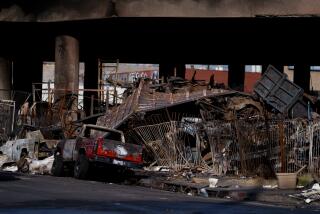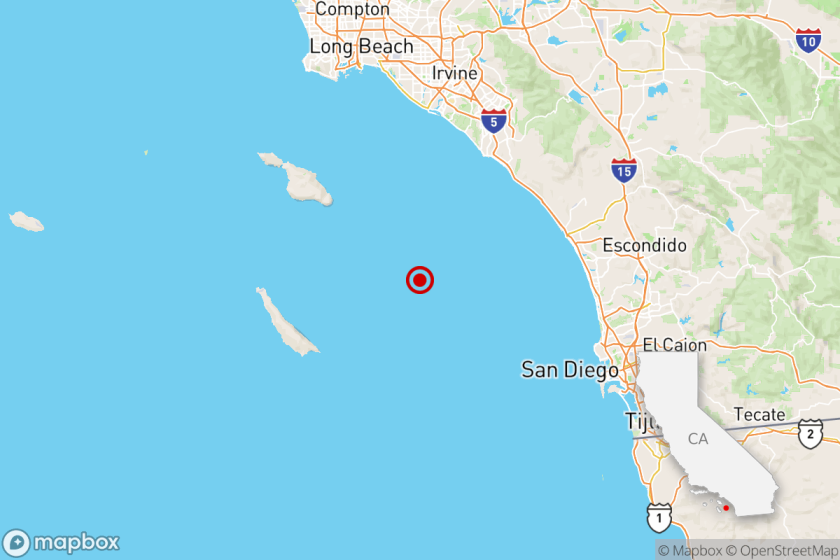Post-Quake Contractor Fraud Widens : Aftermath: Rise seen in number of unlicensed repairmen soliciting or performing work.
Standing in her garage, beneath a twisted and splintered beam that supports the second floor of her Tarzana house, Linda Rubenstein was appalled both at her own mistakes and at the gall of the man who passed himself off as a licensed contractor.
“I can’t believe I paid him $25,000,” she said, pointing out the sloppy repair work. “He just conned me left and right. What can I say?”
After paying thousands to the man, who actually did not have a license, Rubenstein must now pay another contractor $20,000 to have much of the work redone.
“I can’t afford it,” she said. “I don’t have the money. I live on Social Security.”
Authorities fear that more and more quake victims will end up like Linda Rubenstein. Although instances of contractor fraud surfaced just weeks after the Jan. 17 earthquake, the problem is beginning to grow now that homeowners are securing government aid or private loans for repairs.
“We’ve been saying all along the real fraud would not be known for several months and there may be some indication that that time is nigh,” said Deputy Dist. Atty. John Luder, a member of the district attorney’s consumer protection division. “Everything is coming to the surface now. It’s countywide. Any place where there was damage, you can expect that.” Since the quake, the number of complaints received at the Van Nuys office of the Contractor State License Board--which covers the San Fernando, Santa Clarita and Antelope valleys--has skyrocketed to 275 a month, three times the normal average, said Sam Haynes, spokesman for the license board.
“You have a lot of people needing (home) repairs, and they have FEMA money or insurance money,” said Mary Ellen Martinet of Bet Tzedek Legal Aide Society. “We have possibly a whole new group of people who are going to be vulnerable to this home equity fraud and home contractor fraud.”
In a series of undercover stings and sweeps through heavily damaged neighborhoods held in the months since the quake, investigators with the Contractor State License Board uncovered at least 80 unlicensed contractors soliciting or engaged in repair work, Haynes said.
And last week, West Valley police reported a rash of cases involving repairmen who were believed to be unlicensed. At least 30 homeowners called to report that they were approached by workmen who offered to repair cement block walls and driveways at cut-rate prices. Some homeowners lost thousands of dollars.
“The guys do a little work, ask for money for materials, and off they go never to be seen again,” said Sgt. Frank Mezquita. “People think they’re getting a good deal, and the next thing you know they’re getting ripped off.”
But the loss is more than financial.
The time that homeowners could have spent on quake repairs has instead been spent in meetings with attorneys and in calls to police and other law enforcement officials to report or track down unscrupulous contractors.
The staircases leading to 85-year-old Charles Syracuse’s coach at the Blue Star Mobile Home Park in Sylmar are held in place with bricks that he has carefully placed underneath the base. And he is still cautious when he walks on the carpeted floor inside the coach.
“I’m still picking up glass,” Syracuse said, standing in the living room of his coach. “I don’t dare walk around barefoot.”
During the quake, Syracuse’s coach tilted, and six steel rods that held the two staircases in place collapsed. Glasses and other knickknacks crashed to the floor. With money fromFEMA, Syracuse thought he would be able to make all the needed repairs, but now that money is gone and his stairs are not repaired, the carpet has not been replaced and other repairs are still undone.
Syracuse signed a contract and gave another man, who said he was supervisor of the project, three checks totaling more than $6,000 to make the repairs. The workers hoisted the coach and placed jacks underneath, and performed smaller jobs inside the coach. But before the job was completed, the workers suddenly stopped showing up. They had not been paid by the general contractor, they told Syracuse, and they would not return until they had been paid.
After repeated phone calls, Syracuse finally reached the supervisor.
“He said, ‘I will get in touch with you,’ and I haven’t heard from him since,” Syracuse said.
Syracuse estimates that he lost about $3,000 in the deal, but because he failed to get a copy of the contract, even that is only an estimate.
Attorneys with Bet Tzedek are now attempting to track down the contractor who, they said, was not licensed and had presented Syracuse another contractor’s license number.
“I assumed they were honest,” Syracuse said.
Those kinds of assumptions, authorities say, can be dangerous. Finding a contractor is a serious task, and homeowners must take time to educate themselves about the hazards and pitfalls of home repairs.
“They have to be prepared to deal with contractors and it takes some homework,” said Larry Chafe, assistant regional director with the State Contractor License Board.
As FEMA checks and insurance money roll in, now is the time when that education is especially needed. Disasters have a way of attracting people from all over the country, who come hoping to cash in on whatever money is flowing because of the calamity. Of the unlicensed contractors arrested in sweeps, some have come from Nevada, Texas and Arizona.
“We have learned that there are disaster-chasers who will go from the Miami hurricanes to the floods in the Midwest to fires and earthquakes in California,” Haynes said. “There seem to be people who indeed go where the misery is and try to take advantage of people.”
Even if a person is licensed in another state, that license is not valid in California. And it is illegal for anybody to contract without a license for work that is worth $300 or more. Such work in an official disaster area can be a felony.
Granted, some disputes with contractors can arise from miscommunications by the homeowner, the contractor or both. But, said Chafe of the state licensing board, “anytime homeowners have a dispute with a contractor where there’s a question if the contractor acted lawfully, they should file a complaint.”
But even before the work begins, the homeowner should check out the contractor. In Linda Rubenstein’s case, she checked her contractor’s credentials with the state after the work was completed. She learned that the license he gave her actually belonged to another contractor.
Now, she says, he has refused to respond to her and her son’s requests for a settlement. They have spent much time and effort calling city and state agencies hoping to find a way to get at least part of the money back.
“I know I’ve come out a loser, but I can’t let him get away with everything,” she said. “That’s holding up my house, that beam. . . . God forbid we have another earthquake. It could all collapse.”
Checking Out a Contractor
There are some measures homeowners can take to avoid problems with contractors, according to the Contractor State License Board.
Homeowners should always get at least three bids on any job. To ensure that the contractor is licensed, the homeowner should ask for a license number and to see the contractor’s pocket license, a plastic card the size of a credit card with the contractor’s name and license number on it. This card is issued by the CSLB and carries the logo of the Department of Consumer Affairs. It has a magnetic strip on the back, said Sam Haynes, spokesman for the CSLB.
It is not uncommon for unlicensed contractors to give false license numbers.
“I’ve seen them use their driver’s license number or somebody else’s number,” Haynes said. “I’ve seen one guy use his phone number in reverse.”
A contractor’s licenses is like a driver’s license, Haynes said. It is not transferable and can only be used by the person it is assigned to or a partner listed with the CSLB.
Homeowners should call the Contractor State License Board, not only to determine if the license is valid, but to determine if the person has ever been cited or if there are any actions pending.
The board can also tell if the contractor has workers’ compensation for employees. Without workers’ compensation, a homeowner may be liable for any injuries to the contractor or his workers while they are on the homeowner’s property.
To check on a license number, call: 800 321-CSLB.
To obtain the CSLB booklet “What You Should Know About Hiring a Contractor” or to file a complaint, homeowners may call the district offices of the CSLB:
Van Nuys (818) 901-5168
Los Angeles (310) 412 6395
Ventura (805) 654-4515.
The Bet Tzedek Legal Aide Society, Earthquake Unit: 800 931-5297.
More to Read
Sign up for Essential California
The most important California stories and recommendations in your inbox every morning.
You may occasionally receive promotional content from the Los Angeles Times.









